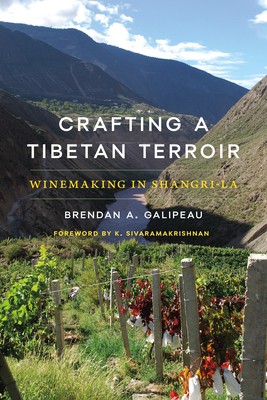
- We will send in 10–14 business days.
- Author: Brendan A Galipeau
- Publisher: University of Washington Press
- ISBN-10: 0295753366
- ISBN-13: 9780295753362
- Format: 17.8 x 25.4 x 1.3 cm, minkšti viršeliai
- Language: English
- SAVE -10% with code: EXTRA
Reviews
Description
Set in the Sino-Tibetan border region renamed "Shangri-La" (from the famous 1930s novel and film Lost Horizon) by the Chinese government for tourism promotion, Crafting a Tibetan Terroir considers how the deployment of the French notion of terroir, or "taste of place," works to create new forms of ethno-regional identities and village landscapes through the production of Tibetan wine as a commodity. In Shangri-La, a rapidly developing international ethno-travel destination, European histories and global capitalism are being reestablished and reformulated through viticulture, which has altered landscapes and livelihoods. From the introduction of vineyards by nineteenth-century French and Swiss Catholic missionaries to make sacramental wine, to twenty-first century commercialization, this ethnography documents the ways Tibetans are indigenizing modernity in the context of economic development on their own terms. It provides timely insight into China's rapid entry into the global wine market, highlighting the localized impacts of this emergent industry, which include transformation from subsistence agriculture to monocropping and intensified agrochemical use. It also addresses larger issues of international trade, suggesting that certain commodities--stimulants and intoxicants in particular--have long connected Europe and the Asia Pacific region, and that these connections are now being reconceived in fashioning new industries and identities.
EXTRA 10 % discount with code: EXTRA
The promotion ends in 23d.12:52:47
The discount code is valid when purchasing from 10 €. Discounts do not stack.
- Author: Brendan A Galipeau
- Publisher: University of Washington Press
- ISBN-10: 0295753366
- ISBN-13: 9780295753362
- Format: 17.8 x 25.4 x 1.3 cm, minkšti viršeliai
- Language: English English
Set in the Sino-Tibetan border region renamed "Shangri-La" (from the famous 1930s novel and film Lost Horizon) by the Chinese government for tourism promotion, Crafting a Tibetan Terroir considers how the deployment of the French notion of terroir, or "taste of place," works to create new forms of ethno-regional identities and village landscapes through the production of Tibetan wine as a commodity. In Shangri-La, a rapidly developing international ethno-travel destination, European histories and global capitalism are being reestablished and reformulated through viticulture, which has altered landscapes and livelihoods. From the introduction of vineyards by nineteenth-century French and Swiss Catholic missionaries to make sacramental wine, to twenty-first century commercialization, this ethnography documents the ways Tibetans are indigenizing modernity in the context of economic development on their own terms. It provides timely insight into China's rapid entry into the global wine market, highlighting the localized impacts of this emergent industry, which include transformation from subsistence agriculture to monocropping and intensified agrochemical use. It also addresses larger issues of international trade, suggesting that certain commodities--stimulants and intoxicants in particular--have long connected Europe and the Asia Pacific region, and that these connections are now being reconceived in fashioning new industries and identities.


Reviews